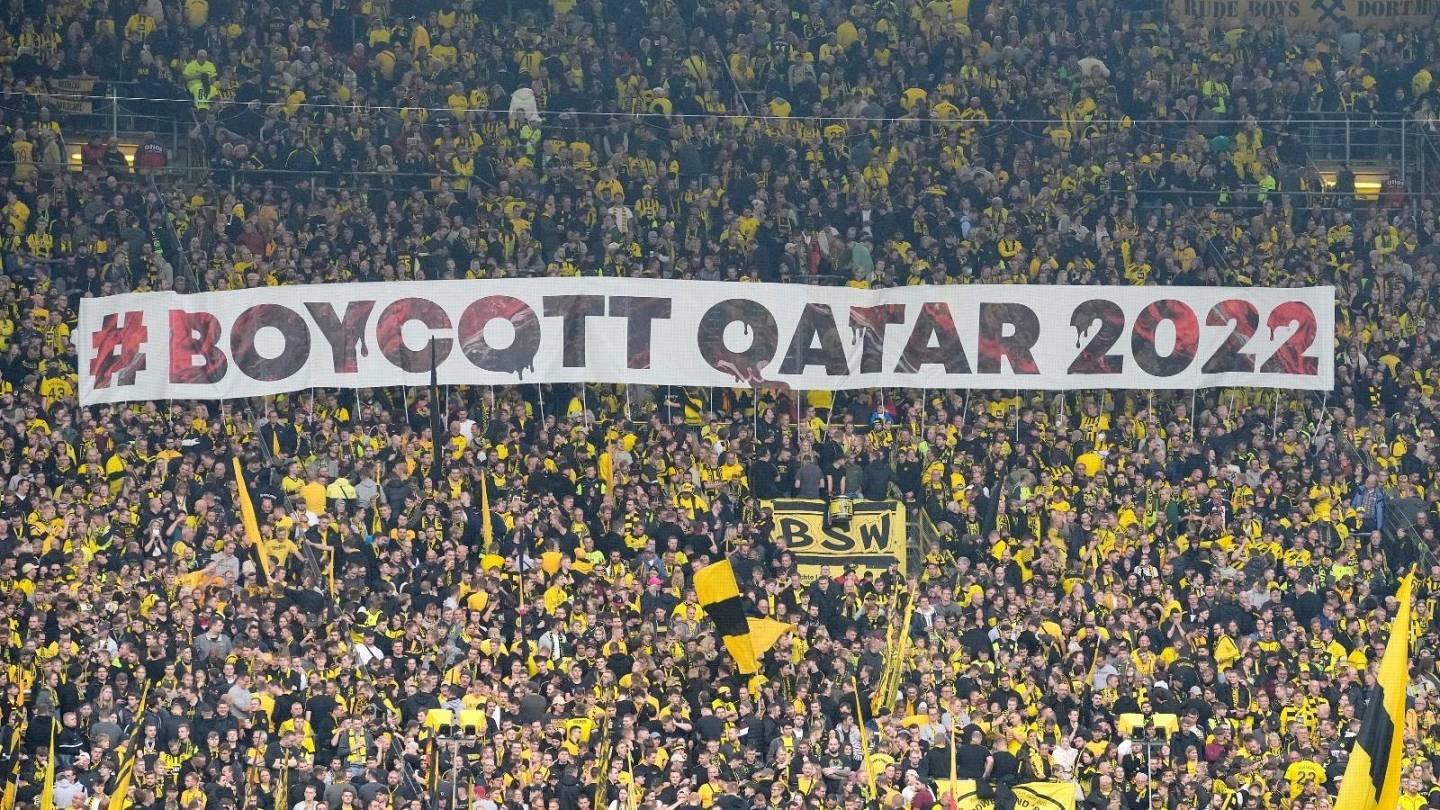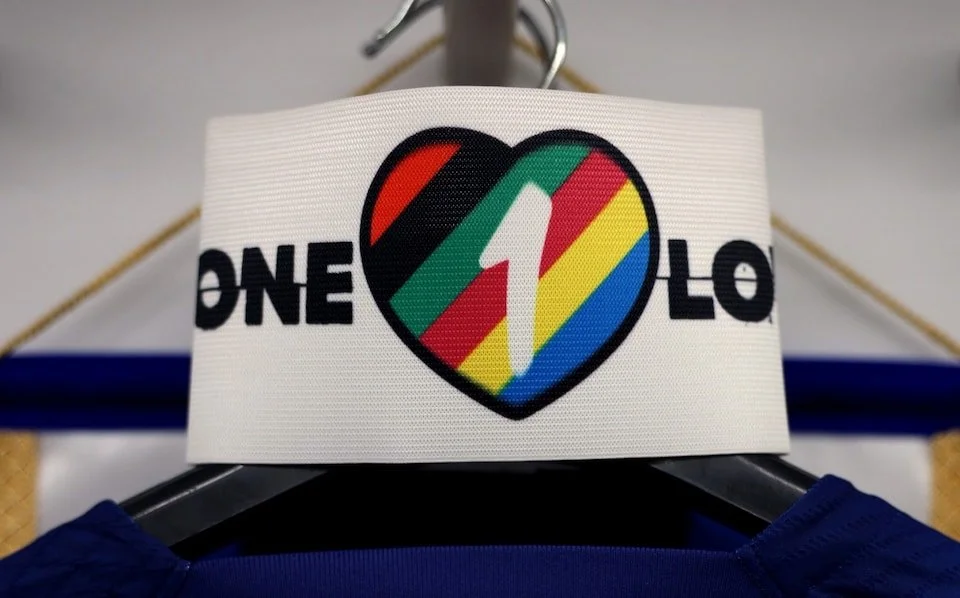The World Cup: A DIVIDED PUBLIC
BY LARA MILLER
CONTENT WARNING: MENTIONS OF HOMOPHOBIA AND HUMAN RIGHTS VIOLATIONS
The FIFA World Cup has been an ever-growing global competition since 1930, every four years national football teams hailing from around the world travel to a singular destination to compete for the coveted championship title. In 2022 this event has found itself located in Qatar. This was announced to be the host country in 2010, making Qatar the first Middle Eastern country to hold the event. However, this winning bid was not announced without controversy; the global public seem to be divided on what to think and how to approach this year’s instance of the beloved tournament.
The first element of public disapproval I remember encountering was the decision that the World Cup would take place in the winter, with Qatar commonly reaching above 45°C in the summer, as the heat would be dangerous to compete in. Growing up in the UK, the World Cup always holds fond memories of time spent in gardens with family and friends watching the games, adults drinking in the summer heat while siblings and cousins played their own game of 5-A-Side behind us; the World Cup is so intrinsically a summer event. With just a moment spent talking to those same peers this year, it’s not difficult to feel the disdain at having to walk through rain and ice to make it to an overcrowded, underheated pub. Yet, as the games approached, the conversation surrounding Qatar as the host country began to shift into something political, a battle of morality.
Media narratives surrounding the World Cup began to explore Qatar’s history of human rights violations: restrictions surrounding freedom of expression, women’s rights, the safety and rights of migrant workers and the use of the death penalty, all joined the conversation that deemed Qatar an unfit host for this tournament of global unity. One issue took precedent in these discussions: the treatment and safety of the LGBTQ+ community; with many condemning this year’s tournament and those who intend on watching it, as homophobic, with a public outcry to boycott the event.
I spoke to a few members of the FUZE cast, to gauge opinions on the controversy. *
Do you usually watch the World Cup or engage with football to any degree?
Alke (They/Them): I watch all of the major tournaments, especially the big two: the Euros and the World Cup. It's not as if I watch it religiously, but I've previously enjoyed it and kept up with it as I have this year, intentionally or unintentionally. However, I find it challenging as a queer non binary person, who, if I'm out, will normally be in drag, to find myself watching it socially. As it's unfortunately a very specific 'look' and that I often find watching it, which doesn’t necessarily match the way I express myself. I’m sure there are queer groups that watch the games, and there are safe spaces to express myself and enjoy them at same time, just this year it feels more dangerous.
Connor (He/Him): Yes I watch football, sometimes I go to games in Bristol too! I also used to play when I was younger.
Gurvin (She/Her): No, I usually don’t. I don’t think I ever will.
What discourse have you heard surrounding this year’s World Cup in Qatar, what are your opinions on it?
Alke: It’s hard to avoid the discourse and collective outrage. Working conditions were abysmal: immigrants being forced to do labour in exchange for passports instead of incomes, workers being denied food and water with no pay meant they could easily be described as slaves with estimates reaching 4000 workers lost their lives in these conditions. The illegality of homosexuality in Qatar however is mainly what I’ve seen discussed, being LGBTQ+ identifying carries a prison sentence and supposedly extremely ill treatment in detention. While Qatar announced they were happy having anyone in their stadiums to watch the game, ambassadors of the World Cup expressed their disdain, including Khalid Salman referenced homosexuality as being ‘damage in the mind'.’ It's hard seeing the faces of all of your friends when you walk into a pub and a match is playing and all of the things you're scared of flash back into your mind.
Connor: A lot of negative press, mostly around human rights issues in Qatar: the awful treatment of migrant workers, extreme homophobia and also corruption with FIFA. I think, for some reason, it’s been posed as a difficult situation to comment on, mostly because of the amount of money pumped into the games. There are also calls from other Islamic countries for Westerners to respect their cultures which adds complexity to the discussions. However, I do see the irony in countries like the UK trying to attack Qatari human rights violations, when their governments are also destructive and oppressive - particularly towards migrants, women, people of colour, etc. Qatar hosting has been an issue since they were awarded the tournament back in 2010 but nowhere near enough was done to try and prevent it. By the same token Russia were the previous hosts and America is hosting the next one, but no one seemed to care about either of them, both of which have caused more damage globally and historically than Qatar ever have.
Gurvin: The main discourse I would say that I have seen around the World Cup is that Qatar bribed FIFA into letting them host. Leaving that aside as this is something I admittedly know little about, the deaths of migrant workers while building the stadiums and the absence of rights for the LGBTQ+ community are obviously things I have seen discussed. However, migrant deaths of individuals from Pakistan, India and Bangladesh in countries such as Qatar aren’t new, but have gone fairly unnoticed. I think that having the football in Qatar has the potential to be a moment for change and open conversations surrounding human rights. It’s important to note that this is not a ‘middle-eastern issue'‘, the UK enables low-paid migrant workers to be exploited through our own immigration laws. So maybe it’s time the UK reviews it’s human rights policies and move forward also.
Would you consider yourself generally politically engaged, or has the specific criticism surrounding the World Cup piqued your interest?
Alke: I am generally politically engaged, yes. I attend protests where I can, donate to fundraisers, charities and volunteer where possible to try and make active differences. I recognise my place in politics because of how I identify and especially due to the trans laws being passed and the homophobia in the government in the UK currently. I also wouldn’t say Qatar peaked my engagement, rather that it engaged others and we pack together when faced with something difficult.
Connor: I am definitely politically engaged, I was a Labour Party member but I now find myself being rushed away from all current political narratives in the UK. The World Cup is an interesting talking point to bring people into International politics, however, as a history graduate, it is important to note the atrocities committed by all participating countries, not just the host.
Gurvin: Yes, as a lesbian, woman of colour, I am politically engaged. I find this however a difficult topic, as we can not intrude with western universalist beliefs onto Qatar and must respect the countries religious beliefs. This approach does have its limits though, as there will undoubtably be queer people in Qatar, whose lives are endangered due to the country they were born in, with no choice of their own.
A detailed view of the ONE LOVE captain’s armband. CREDIT: GETTY IMAGES
Have you heard of the issues with the ‘one love’ armband and the England team? What do you think?
Alke: I have. It's ridiculous that they wouldn't risk a yellow card in order to show support. I understand it's something they train for, and that it's a big opportunity and milestone in any players’ lifespan, but this is not a disqualification. This is not a prevention of ever working in football again, it's a yellow card. Players will risk diving, illegal tackles etc, when normally playing, so what's the risk to support millions of lives? Something is always better than nothing in terms of allyship and political progress. Even if I believe in the cause or not, but if you want to see change, everything can mean something.
Connor: Yes, I think the armbands were indifferent, if they really wanted to protest they wouldn’t have shown up. Virtue signalling counts for nothing when pockets are lined with money from the corporations they are protesting.
Gurvin: I have heard of the armbands, ultimately, I think it shows the true performative nature of the England team. Personally, I think if you’re that good of a football player, a yellow card wouldn’t scare you; if you lose, at least you lose with dignity. Their complacency can be compared with the behaviour of the Iranian team not singing their national anthem to protest the current political climate in Iran, which holds far worse consequences than a yellow card.
With World Cup viewership statistics on the rise despite these ongoing political discussions, it seems the public are truly divided over what to do with the nation’s favourite sport.
*All opinions expressed are those of the individuals spoken to, all answers discussed were edited for length and clarity.


